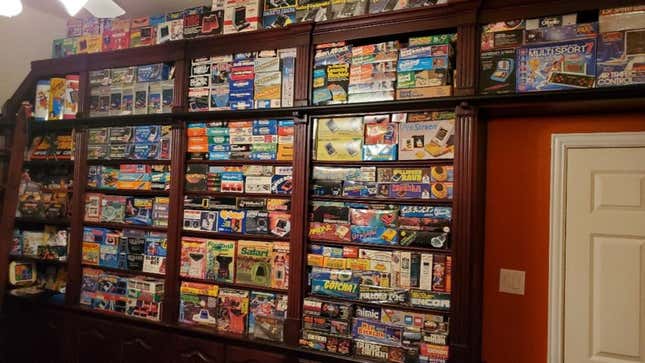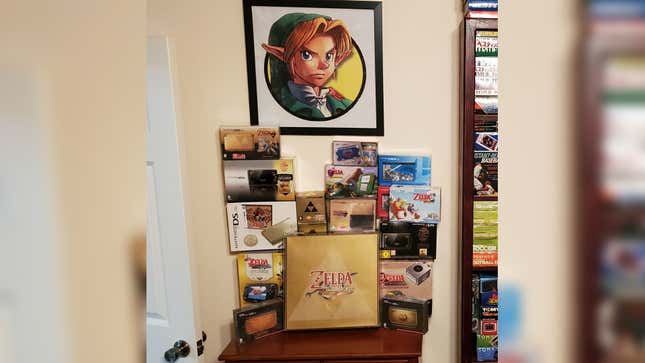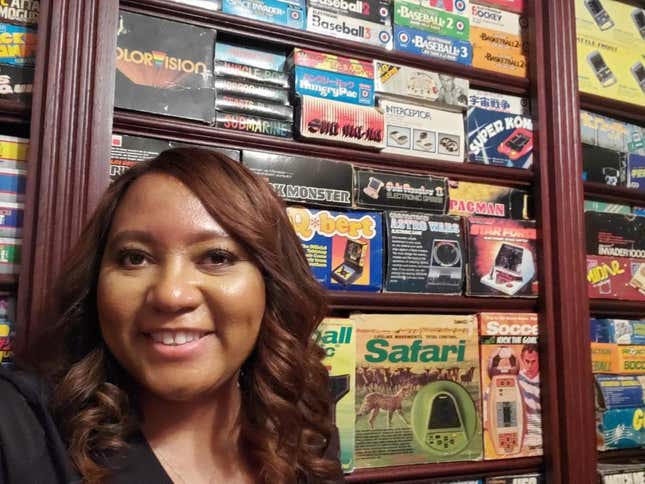There’s a room in Linda Guillory’s house that could make any video game nerd fall to their knees in worship. Her walls are lined with sturdy shelving units and display cases, each stuffed with boxes upon boxes of handheld video games. But unlike most video game collections that are kept behind glass, in plastic vaults, and protected by their factory seals, Guillory’s collection bears the less-than-mint marks that come with use and Guillory wouldn’t have it any other way.
“I collect games because I love them,” Guillory told Kotaku of her collection, which has earned her two Guinness World Records. “And if I love them, I’m gonna play them.”
Guillory was eight when she salvaged her first handheld video game, a broken Red Conic basketball game, from a thrift shop in Monroe County, Michigan. Growing up, her father was the town handyman, and it was from him that she got her lifelong love of fixing broken things.
“If you had a washing machine that went bad, he stripped that down and we sold that for scrap metal,” she said.
Youngest of nine children, Guillory helped her father with his work. Her job was to use her nimble child’s fingers to extract copper from motors. As payment, she could have whatever magnets she could find.
But fiddling with magnets wasn’t enough to satiate Guillory’s hunger to play. During trips to the Goodwill or the Salvation Army, she lit upon all the donated electronic games and begged her mother to buy them, regardless of if they worked or not.

That the Red Conic game was broken didn’t matter to Guillory. With years of experience, even at eight, repairing it came second nature to her. She had “the knack.” She cleaned the dirty battery contacts and got her father to solder the other broken parts. It was playable but never fully fixed. There was a square on the game’s board that never lit up. But intimately knowing the innards of a game she repaired herself granted her an advantage playing it with others.
Guillory comes from a family of game fans and says that her older sister is the “real gamer” of the family. One fateful day in 1987, that sister came home from college bringing with her a gift.
It was a Nintendo Entertainment System.
“It changed my life,” she said.
Gaming became a family pastime. The Guillorys surrounded the NES, passing the controller back and forth, encouraging one another, and shouting commands and tips to get past difficult sections.
“One of my older brothers, his hands were too slow, too big and clunky to play. But he would coach me through it. We’d be sitting there and he’s like, ‘Okay, now jump!’”
The Nintendo Entertainment System meant family to Guillory—something its creators intended by naming it “Famicom.” She started her life as a collector with Nintendo games because they reminded her of those happy times. Guillory has a special place in her heart for The Legend of Zelda—it was the game her sister brought home with that first console.
Memories of solving the first Zelda game with her sister later translated into a desire to own as many Zelda-branded games as possible. She has a section carved out in her gaming room dedicated to her Zelda collection.
“If there was a GameBoy that came out with Zelda packaging, I got that. The DS, the 2DS, the 3DS—anything with Zelda packaging.”

Even before Guillory became a dedicated collector, she behaved like one. She had a rule that if you loved something, buy two of it. In service of that rule, she and her sister owned two original copies of The Legend of Zelda—a game that recently retailed for almost $900,000. One copy they kept to play, and the other they kept in storage at their mother’s house where it remained for years until a fire claimed the house and the buried gaming treasure it contained.
That house fire also claimed her Coleco Pac-Man game, a gift for her 13th birthday. Before Zelda came into her life, Guillory loved the little LCD table-top version of Bandai-Namco’s pellet munching maze-runner. She played often, literally sleeping with it like Linus and his blanket. She took such great care of it that it was still working when she brought it with her to college. One night, while reminiscing with her brother, he asked about that beloved Pac-Man game. When she answered that it had been claimed in their mother’s house fire she was hit with a revelation.
“I’m not a poor kid anymore. I can afford these.”
After the visit from her brother, she went to eBay looking for the Coleco Pac-Man and found listings for other games she loved as a child and yet more she desired but never had the chance to own. At first she bought them broken, like that Red Conic game all those years ago, and also like that Red Conic game—she fixed them. It was economical too because the prices were so low, but as she slowly started to accumulate the games of her youth, her tastes elevated. Instead of buying broken and unboxed versions of the games she wanted, she started looking for boxed versions.
“I remembered the box art. Those brought back memories too so I started buying boxed games.”
Guillory started her collecting by raiding the local thrift stores. There she mostly found old Sega and Nintendo cartridges. eBay made her life easier, allowing her to narrow her searches to specific categories. But Guillory’s collecting exploded through travel.
Guillory earned a degree in electrical engineering from the University of Michigan. Later, she got a job at Texas Instruments working for the people who make the Doom-compatible calculator gave her the opportunity to travel around the world.
“I’ve gotten the opportunity to travel the world. I’ve found games in Germany, Taiwan, the Philippines, and, of course, Japan.”
Whenever she went to Japan, Guillory would schedule her trips such that she’d have the weekend to crisscross Tokyo hunting for treasures. She did not speak Japanese at all and relied on the great kindness of her coworkers to not only translate phrases for her to use to get around.
“I would tell them I was coming to town and they would say, ‘Hey, I was in this store two weeks ago and they had a lot of handheld games.’ And they would give me directions on how to get to that store. They were absolutely wonderful.”
Guillory visited Japanese retro gaming mainstays like Mandarake and Super Potato, often getting lost trying to locate them because she wasn’t used to and therefore couldn’t recognize Japanese storefronts having descending stairs. For 10 years she traveled for work, bringing home whole suitcases full of her hauls. She got so good at finding handhelds and knowing what they were worth that she wrote a pricing guide (under her maiden name of Watson) for other collectors to use.
Guillory has over 3,000 pieces and is still growing her collection. She mostly stays away from Tiger Electronics, the cheap handhelds I remember from the ’90s. However, there is one Tiger Electronics game from the ’80s she would love to have—her white whale.
“Star Castle. It’s believed to be unreleased, but one guy told me he had it and he sold it and he didn’t have any pictures. I’m still looking for it, I would love it if I ever found one.”
She won’t share what the most expensive piece in her collection is because she doesn’t like to think about these games in terms of their monetary value. To her, their worth is in the joy they bring, not how much money she can get. She shared a story about how she turned down a sizable offer for one of her rarer pieces because she loved it too much. No amount of money could get her to let it go.
I halfway wish Ms. Guillory was one of my aunties. Not only because of her enviable collection of thousands of handheld games but also because her life as an endlessly curious tinkerer would have set a shining example that a younger me could have used to feel secure in my budding nerdy curiosities.
I do not lack for strong women in my family to look up to (hey, Ma!). But so often, Black women and women in general are often taught that the strength we need to survive must come at the expense of our humanity and the things that bring us joy. If we must work twice as hard for half the credit, then there is no time for games. Ms. Guillory’s Black womanhood matters because not only did she make time for games, but used her experience with them to forge life and career that’s made her happy—a story she hopes will inspire others.

“Growing up where I grew up, how I grew up, I don’t think people would have thought that I could become an electrical engineer. But I do know anybody can do it, and I think there are skills in gaming that lead you to engineering.”
She believes the problem solving employed to beat a game ties into the kind of problem solving engineers use. Guillory has a story about that kind of problem solving that she tells when she gives presentations to children on how to turn their hobbies into fulfilling careers.
“I had a football game and it didn’t have a sound switch. So I took it apart and I put in a little switch on the side [to turn the sound off] so I could play in Study Hall.”
Years later, when the game maker did a retro re-release, it included a sound On/Off switch.
“They got that from me,” she laughed.